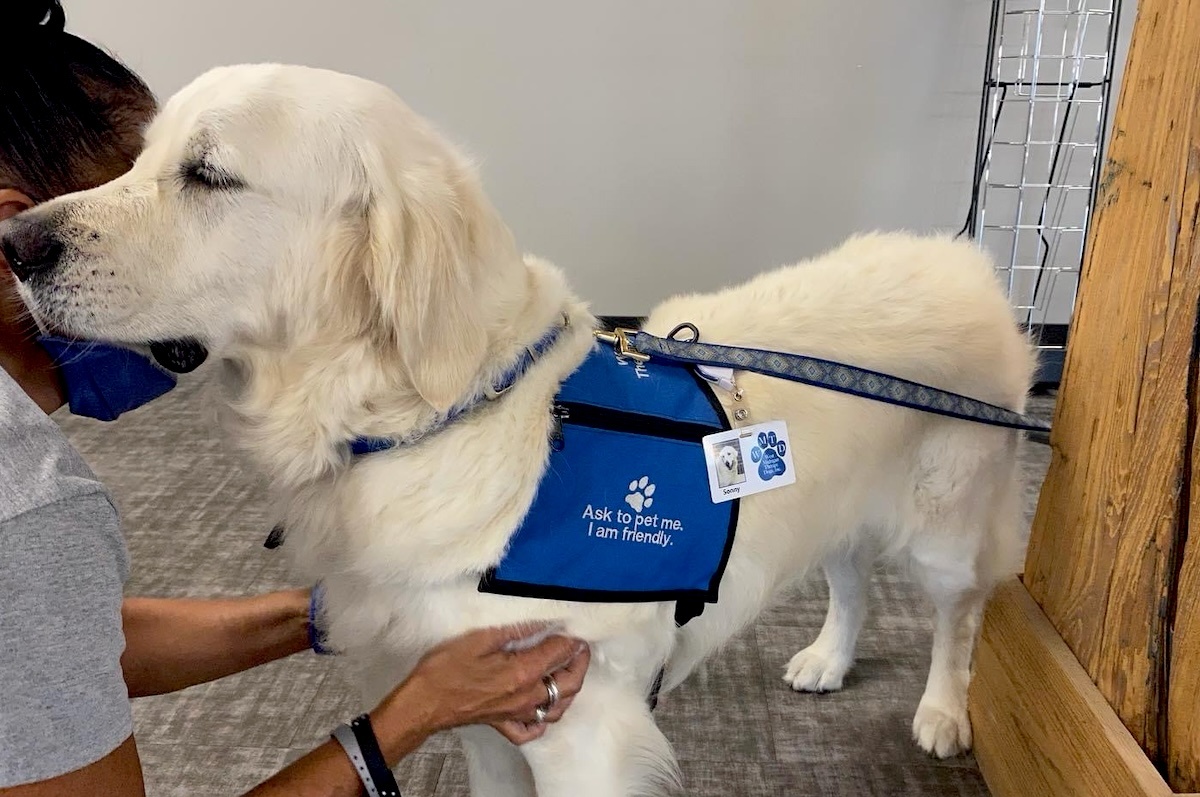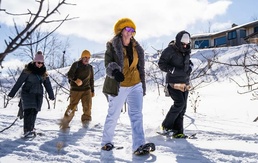
Who’s a Good Puppy? Therapy Dogs!
Local businesses share the ins and outs of training therapy dogs
By Geri Dietze | Sept. 13, 2025
Records of canine companionship go back thousands of years, and the bond between dog and human has been used therapeutically for far longer than we might imagine.
The first “moral” treatment for mental illness was in 1796 in England. Forgoing restraints, leeches, and ice baths, York Retreat used small domesticated animals to interact with patients. Florence Nightingale, she of modern nursing, took note in the 1850s, and Sigmund Freud brought his dog Jofi to work. Animal companions helped WWII pilots with “pilot fatigue,” aka PTSD, and in the 1950s, child psychologist Boris Levinson coined “pet therapy” after seeing patients respond to his dog Jingles.
What Exactly Is a Therapy Dog?
First, some definitions. Therapy dogs are different from service dogs, which master a specific task to aid an individual with lifestyle challenges. Service dogs help us see, hear, retrieve dropped items, recognize a seizure or blood sugar spike, remind us of our meds, calm us during a panic attack, or steady us if we have mobility issues. All service dogs have public access rights under the Americans with Disabilities Act (ADA). And, given their life saving skills, they are not cheap, with the average service dog costing $25,000.
On the other hand, a therapy dog is a pet, of any breed or mix, with a calm, friendly demeanor, who enjoys new people, is comfortable with crowds and noise, and has an altruistic owner who wants to share their dog with others in public settings. This is volunteer work, offering emotional comfort, positivity, and a sense of purpose; reducing isolation and increasing social interaction; and providing a therapeutic calm for those managing chronic pain.
Therapy dogs work their magic in schools, hospitals, nursing homes, day care, or any place or anywhere they are welcome. While they are trained, they do not require certification but sometimes need validation through an outside source, for insurance purposes, depending on the setting. Consult your trainer for more information.
Even a calm, well-mannered dog will need some training to grasp the finer points of therapeutic help. Northern Express talked to two local trainers about the business of turning your best friend into a therapy dog.
Dog Training Elite of Northern Michigan
Dan Lutchko was a cat person, but he “fell in love with,” his wife’s little dog and made a career upon purchase of his Dog Training Elite (DTE) franchise. DTE was founded over 40 years ago, by and for dog owners, with over 100 locations nationwide. Currently, Lutchko provides in-home training from Ludington to Mackinaw, and a facility is in the planning stages.
“A therapy dog is NOT a service dog for you,” Lutchko stresses. “A therapy dog is trained by [the owner] to help others … and then you volunteer to spread the ‘unconditional love’ that every pet owner understands.”
The average session is 1 hour weekly for the owner, who gets a 20-minute homework assignment to do every day with the dog.
“Obedience comes first,” Lutchko explains, balanced with positive reinforcement. “Teach the [skills]: come, off, sit, down, place, and heel. When they start to ‘get it,’ move outside into a park, a street, or a store.”
About 30 percent of Elite’s business is therapy dog training, and Lutchko estimates that in 2025, he has trained about 100 dogs who volunteer around the region. The total cost for training is $3,000.
Learn more at dogtrainingelite.com/traverse-city/training/therapy-dog-training-program
Barks and Rec. Animal Training and Behavior
After 20 years training animals, Alicea Howell loves dogs best. She is a licensed vet tech and one of only 30 or so behavioral vet tech specialists worldwide. Along with other certifications, she speaks and writes about animal training and mainly runs her 4,000-square-foot facility herself, with four part-time workers.
“Any dog is capable and any dog can succeed as a therapy dog,” Howell says, noting that she probably has 20-30 dogs who have gone through her program that are working in therapy settings this year. “We use only positive reinforcement with [both] animal and…human, [and] each human is reinforced differently.”
Students can expect patience and kindness, and for Howell, there are no stubborn dogs or owners. “There can be confusion at both ends, [for both] dog and owner,” she explains. (If you’ve ever seen a dog walking its human, you understand.)
Training goes beyond basic commands to more complex signals like eye contact and leash tautness. Owners practice these skills in class and then repeat the exercises at home.
“The hardest thing is focus,” Howell explains. “Once the focus of the dog is on the trainer, everything else is easy.”
Barks and Rec. offers two therapy dog groups per week, with six to seven participants in two six-week sessions. Students work in class and at home to reinforce the lesson. The 12-week course is $480; some dogs are not ready at 12 weeks, so they can retake classes. But Howell adds that not all therapy dogs need a ton of classes. “Sometimes they have a particularly good owner/trainer.”
Visit barkranger.net or call (231) 590-7497 to learn more.
Meet the Pups
Oakley
It was a dream of Michelle Loeffler-Rohraff, LMSW, to bring a therapy dog into her mental wellness counseling for children, adolescents, and adults, and three-year-old Oakley has adapted beautifully to his position. Deemed a “fast learner” and a “natural” by Elite trainer Dan Lutchko, Oakley spent one year under his tutelage. “[B]y using his instincts and training, [he] quickly adjusts to who needs him and who needs space,” Loeffler-Rohraff explains. In his free time, Oakley likes to play and nap.
Rosie & Lani
Rosie and Lani have a busy touring schedule with weekly gigs at Old Mission Peninsula School, Traverse City Christian School, Eastern Elementary, and Peninsula Community Library, where they spend time with young readers. (And that’s not even the full schedule.) These Bernese Mountain Dogs attend Barks and Rec. for what mom Candy Gardner calls “continuing education,” like obedience class to practice focus and leash skills…because even big fluffy dogs can be lifelong learners.
Trending

A Tale of Two Historic Buildings in Elk Rapids
For one iconic building in Elk Rapids, a 2025 controversy has largely subsided. But for another it continues, as ownership t… Read More >>
There and Back Again at Old Town Playhouse
We’re going on an adventure! And there will be trolls, goblins, and giant spiders! But also good friends and better ta… Read More >>
Slushy Outdoor Fun
Ready to get a little sloshy—we mean slushy? Local wineries and winter-weather hotspots are leaning into the season wi… Read More >>


